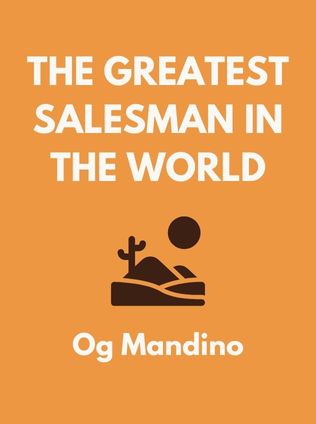
The Greatest Salesman in the World
By Og Mandino
Published 01/1968
About the Author
Og Mandino, born in 1923, was an American author renowned for his inspirational books on self-improvement and success. Before becoming a celebrated writer, Mandino experienced numerous hardships, including battling alcoholism and contemplating suicide. His life took a turn for the better when he stumbled upon self-help books in a library, which sparked a transformation in his outlook on life. This pivotal moment led him to write "The Greatest Salesman in the World," a book that has inspired millions since its publication in 1968. Mandino's writing is characterized by its simplicity, clarity, and profound wisdom, which he delivers through parables and allegories. His work continues to inspire readers to seek personal growth and achieve their highest potential.
Main Idea
"The Greatest Salesman in the World" is a timeless masterpiece that blends self-help techniques, sales strategies, and Christian allegory into a powerful guide for personal and professional success. The book's core message is that success, whether in sales or life, is achieved through the cultivation of specific habits and attitudes. Mandino presents these principles through the story of Hafid, a poor camel boy who aspires to become a great salesman. Through his journey, Hafid learns the importance of self-confidence, persistence, love, humility, and other key traits. The book's wisdom is encapsulated in ten scrolls, each containing a principle that, when followed, leads to a successful and fulfilling life.
Table of Contents
- The Parable of Hafid
- Scroll I: Form Good Habits
- Scroll II: Love Others
- Scroll III: Don’t Quit
- Scroll IV: You Are Uniquely Valuable
- Scroll V: Treasure Your Time
- Scroll VI: Master Your Emotions
- Scroll VII: Don’t Be Too Serious
- Scroll VIII: Set Goals and Exceed Them
- Scroll IX: Do It Now
- Scroll X: Pray for Direction
The Parable of Hafid
The story begins with Hafid, a poor camel boy who dreams of becoming a wealthy merchant. Despite his humble beginnings, Hafid is determined to change his fate. His mentor, Pathros, a successful merchant, recognizes Hafid’s potential and ambition. Pathros entrusts Hafid with ten ancient scrolls that contain the secrets to success. However, Pathros sets conditions: Hafid must keep the scrolls a secret until he finds their next rightful owner, and he must always be generous to those in need.
As Hafid embarks on his journey, he diligently follows the principles outlined in the scrolls. These principles not only help him amass great wealth but also transform him into a wise and compassionate leader. Eventually, Hafid, now an old man, gives away his fortune and waits for the scrolls' successor. The story culminates with the arrival of the Apostle Paul, who will use the scrolls’ wisdom to spread the teachings of Jesus.
This parable serves as a powerful framework for the lessons contained in the scrolls. It illustrates how the application of timeless principles can lead to profound success, not just in material wealth, but in personal fulfillment and spiritual growth.
Scroll I: Form Good Habits
The first scroll emphasizes the importance of habits in shaping our destiny. Habits are the building blocks of success. As Mandino writes,
"In truth, the only difference between those who have failed and those who have succeeded lies in the difference of their habits." - Og Mandino
Good habits lead to positive outcomes, while bad habits can sabotage our best intentions. The scroll encourages readers to consciously replace negative behaviors with positive ones. This transformation doesn't happen overnight; it requires daily commitment and perseverance.
To form good habits, one must start small and be consistent. For example:
- If you want to improve your physical health, start by incorporating a 10-minute walk into your daily routine.
- For better mental health, practice gratitude by writing down three things you’re thankful for each day.
- To improve your productivity, set aside the first hour of your workday for your most important task.
Over time, these small actions become ingrained in your daily routine, leading to significant changes in your life.
Scroll II: Love Others
The second scroll teaches the power of love and how it can transform both personal relationships and business interactions. Mandino asserts that love is the most powerful force in the world, and by approaching others with genuine love and compassion, we attract positivity and success into our lives.
Sign up for FREE and get access to 1,400+ books summaries.
You May Also Like
The Subtle Art of Not Giving a F*ck
A Counterintuitive Approach to Living a Good Life
By Mark MansonRich Dad Poor Dad
What the Rich Teach Their Kids About Money - That the Poor and Middle Class Do Not!
By Robert T. KiyosakiHow To Win Friends and Influence People
The All-Time Classic Manual Of People Skills
By Dale CarnegieQuiet: The Power of Introverts
The Power of Introverts in a World That Can't Stop Talking
By Susan Cain



















